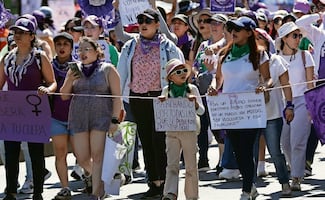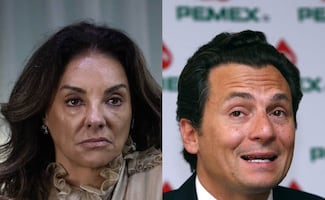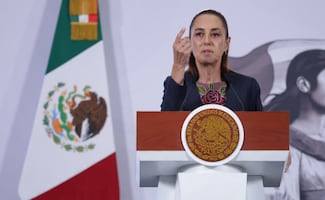Más Información

Colectivas feministas convocan a marcha del 8M; señalan que la violencia contra las mujeres se recrudeció en el país

Corte va por dar cierre a disputa Lourdes Mendoza-Lozoya; “que no se convierta en símbolo de la impunidad”, pide la periodista

Seguridad de Chiapas se abre a indagatoria por narconómina dada a conocer por EL UNIVERSAL; “no tenemos nada que ocultar”, dice secretario
Martha Bárcena, Mexico's ambassador
to the United States is aware that she will be representing Mexico during one of the most complex moments in the history of the bilateral relation , exactly when the United States is going through a highly polarized climate.
During her previous missions, as Mexico's ambassador in Denmark and Turkey , will have little do to with her new tasks in the United States , where she will have to monitor Donald Trump's Twitter account every day, who uses this social network to say negative things about Mexico .
She told EL UNIVERSAL that “I think that you have to have a thick skin in regards to certain things, in regards to other things, you have to know where the red lines are.”
1. With what basis and tools are you going into Mexico's embassy in the United States?
– The main basis I have to establish a new phase in the relations with the United States is the mandate President López Obrador obtained in the polls; we don't have a clearer mandate than 30 million votes, is a very solid mandate that indicates the desire of change in the majority of voters. That mandate of change that we already see reflected in initiatives carried out by Mexico's government in conceptual things such as the fights against corruption, a more just country, with less inequality, the development of the south-southeast, projects are being worked on.
I arrive into the United States and the embassy is going to have a basis to say this isn't going to be business as usual we're going to do things differently and face the problems that, we've known this for a long time, worry not only the U.S. society but also the main business partners, such as the issue of corruption at the highest levels, insecurity, and violence, which is being faced. All this gives us the strength to negotiate with the United States.
2. What do you think the size of this challenge is?
– I think that when President López Obrador talked to me, shortly after the elections, to express his interest in me becoming the ambassador in Washington, I knew the challenge was huge but I didn't imagine I would arrive into the United States in a situation as strained, as polarized. Yes, it's a huge challenge.
3. In the face of a challenge of this size, where are you going to begin?
– One of the priorities this year is the ratification of Mexico's treaty with the United States and Canada (T-MEC), we're looking at the times for the ratification of the treaty in Mexico and how are we going to help the treaty to be ratified in the United States, which is of Mexico's interest, it's an issue that is going to occupy the whole year because we have to be present during the lobbying, and if the ratification is achieved before summer, the implementing legislation will follow.
Another priority will be to check and constantly update what is the situation of the Mexicans in the United States, what migration legislation is being presented in the Senate, in the House of Representatives, we have to remember it's the legislative power that has the faculty in regards to migration legislation.
Obviously [we will work] in coordinating the message we want to send with the embassy and consulates. Explaining in the United States what is President López Obrador's government doing, its achievements.
4. And in regards to migration?
– We will be paying attention because, during Nancy Pelosi's speech at the House of Representatives, it was mentioned that one of the priorities would be migration, which is possible for it to open a window of opportunity, with the Democrats' initiative in the House of Representatives to update the migration legislation. The last big reform took place during Reagan's presidency.
Let's not forget that the migration legislation is the prerogative of Congress, what interests us is that the congress members make their decisions based on realities, not in prejudices, that they know what is happening in Mexico with numbers, so they don't think migration is the same as 15 years ago.
5. Is it an advantage that the House of Representatives has a Democrat majority?
– It can bring many dialogue opportunities but we don't know what are the results going to be because if the political climate is polarized, it's difficult to predict positive results in regards to legislation.
We can't rule out that we could reach agreements but we also have to be realistic and know that at the primaries for the 2020 election begin at the end of 2019m, the discourse is going to be radicalized, it's going to be little rational, it's very likely that Mexico, the border, and migration are still topics of debate because it has been the banner of the most conservatives.
Nevertheless, in the Democrat sector, there's a migratory position that is closer to that of Mexico's vision. We will see if this helps a more rational debate but it would be difficult to predict positive results.
6. Do you see a risk in the fact that the migration issue could be perceived only as a security issue?
– I've told North Americans this a lot and I think that that's the fundamental vision difference between Mexico and the United States: migration is a phenomenon, they see it as a problem, we see it as a phenomenon inherent to humanity, it's an economic and social phenomenon. It has national security dimensions, without a doubt, but it's only one of them, the others are demographic profiles, the aging of the United States' population because many things are going to be robotic but there will be another workforce that will be needed.
The security dimension is one of the many dimensions of the migration phenomenon, that's Mexico's vision. The current U.S. government vision is much more restrictive, it's a vision of migration as security and therefore, they want to face it as a [security] problem to take coercive measures, which is called “securitization” of an issue in academic terms.
By “securitizing” you have a bigger budget, which is what they're looking for. It's a typical case, is exactly what Mexico's government doesn't think is the right approach, but promoting more development is.
7. Are you worried about the operation of Mexico's consulates in the United States because of the limited budget resources?
– Yes but if we check the budget, the Ministry suffered a reduction of 8.8%, for a budget that is already limited, such as the Ministry's, this is a lot. But I think that it's a reduction that can be assimilated with savings in other areas. The budget of the consulates won't be affected that much, maybe we won't have the desired increase but either a drastic reduction.
An important part of the operation and personnel's expenses is paid for with the consulates' revenue, which hasn't been very efficient until now because [money] is raised, it's sent back to the Federal Treasury and it's sent back to us months later, and during that process, the Finance Ministry always keeps a percentage. [Let's] remember that all the resources allocated to the protection are untouchable but there will never be enough money.
8. How are you going to deal with such a sui generis leader, such as President Donald Trump?
– We'll see. The ambassador and the embassy have to be aware of what President Trump says because he's the leader of the United States, but the dialogue with the ambassadors with a foreign President doesn't take place every day, then, we have an every-day-dialogue with the different agencies and when there's something that surprises us, which is beyond a statement, but the acknowledgment of a measure, we will immediately confirm what is happening with the different agencies, what is going to happen, clear things up.
9. You will have to have thicker skin?
– Yeah, I think you have to have thicker skin in regards to some things, in regards to others, you have to know where the red lines are, and in regards to others, I'd expect President Trump, I think he will be aware of Mexico's importance, I think he has to look after, adapt his discourse to his vision.
10. Something that doesn’t look as easy because a confrontation discourse is generated
– He is a confrontational man in all areas, not just in regards to Mexico, unfortunately, it now has turned, because of the border issue, in a topic of internal debate in a polarized society. Now, constantly intervening in that debate probably won't be positive.
11. So we would have to understand that the yellow line can be large and that in order to cross into the red one certain things should happen?
– We tend to say the red line, if certain things happen, the final decision has to be made by Mexico's President himself.
12. Will we see President Andrés Manuel López Obrador in the United States soon?
– Well, President López Obrador said Donald Trump had invited him and we will look at the President's agenda when the time comes and also President Trump's agenda. We will see when the times come. I think that what we have to look at are the times and what type of visit is convenient, if a State visit at the highest level or a working visit, everything will depend on how the relationship, agenda, and schedules of both evolve.
13. President López Obrador said that the visit could take place when there was something important to announce...
– Then I will have to work hard so that there are important things to announce.
gm
Noticias según tus intereses
[Publicidad]
[Publicidad]












